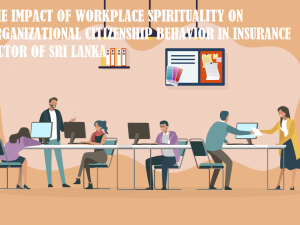Description
Abstract
Employee turnover has been a raising issue among academics in Sri Lanka following prevailing the crisis situation in the country, which may cause people to experience a considerable stress and burden in both work and family life. Due many reasons including psychological stress and issues in living standards in the country, professionals including lecturers, doctors, engineers and lawyers tend to leave the country. Academics, the vital part of an economy is essential to rebuild a country by eliminating the negativities followed by the crisis. However, there are some organizations in Sri Lanka which focuses on spiritual aspects of the workplace to motivate employees to remain in the company. This study aimed at exploring the effect of workplace spirituality on employee turnover I the academic sector in Sri Lanka with 191 sample. Study developed four hypotheses to be tested using SPSS data analysis software package (version 21). Data were analyzed by adopting Descriptive statistics, Pearson Correlation analysis and Multiple Regression analysis and the results were presented in tables and figures. Then, a comprehensive discussion was made along with the findings of previous studies. Study found that meaningful work has a negative impact on employee turnover of academics. The Sense of community also made a negative impact on employee turnover of academics. The alignment of values also was negatively impacting the employee turnover of academics. Finally, workplace spirituality had a negative impact on employee turnover of academics in Sri Lanka. Then, the limitations of the study were stated followed by a few recommendations that the academic sector and future academics/ scholars can follow to mitigate employee turnover while accelerating the spirituality at the workplace.





